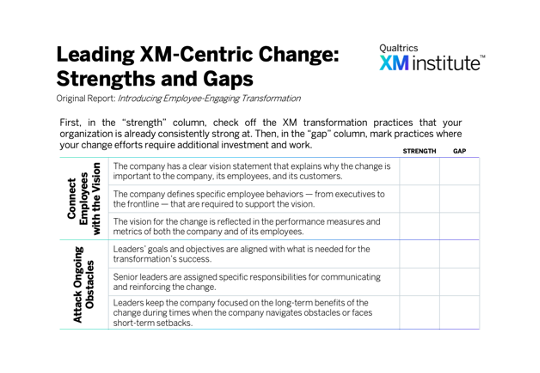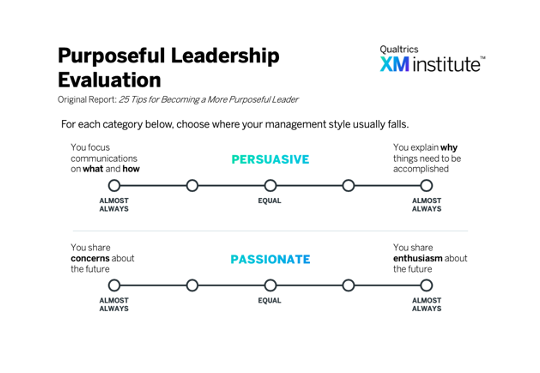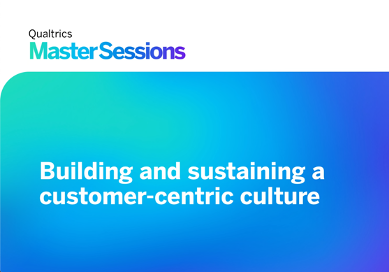Use this Launchpad as a starting place to understand how to build a culture that supports and nurtures your Experience Management (XM) transformation efforts. Then explore the key resources included at the bottom of the page to expand your knowledge of this essential XM topic.
The Fundamentals
Organizations that want to embed Experience Management (XM) as a discipline need to foster an environment that instills XM-centric mindsets and behaviors in their leaders and employees. That’s why culture is so important to XM success – it can either accelerate or inhibit the spread of XM competencies and actions. It’s an organization’s culture that ultimately determines whether XM efforts gain momentum or fizzle out and whether XM actions happen consistently across the organization or only occur in isolated pockets.
Simply defined, culture is about how employees think, believe, and act.
Think
Employees need to be intellectually bought-in and understand what the organization’s vision is and why it is important to the business. This aspect of culture involves things like, what is the organization communicating – both explicitly and tacitly – through its values, routines, and structures?
Believe
Employees need to see that leaders are truly committed to what is important to the company. This aspect of culture encompasses things, what signals and messages are leaders conveying through their decisions and behaviors?
Act
Employees need to adjust their behaviors to align with what is important to the company and what will make them successful. This aspect of culture includes things like, how are the employees actually behaving, even when no one is looking?
Attributes of an XM-Centric Culture
Organizational cultures will all have unique characteristics that help define the company’s core identity. To build a culture where XM-centric mindsets and behaviors are ingrained in all leaders and employees across the business, focus on cultivating four attributes:
Purpose-Led
People make decisions that are consistent with a well-understood mission and set of values. Having a clear, shared organizational purpose will align, motivate, and empower people across the business. In a purpose-led culture, the company mission drives decision-making and company values drive behaviors, which allows people to understand and anticipate how decisions will be made and adjust their behavior accordingly.
Human-Centric
Everyone at an organization demonstrates empathy for its customers and its employees. Experiences are created and consumed by human beings (customers, employees, and partners), so companies must cater to how people think, feel, and act. In a human-centric culture, the company recognizes that business success is driven by engaged employees and loyal customers, so it treats employees as critical assets who need to feel engaged and treats customers as human beings who need their emotional needs met.
Change-Minded
The organization regularly makes improvements without significant internal resistance. For any major XM initiative to be successful, many employees will have to change their behaviors. In a change-minded culture, people embrace the idea that adjusting is a way of life and actively seek to learn from successes and failures, applying what they uncover to future attempts.
Evidence-Based
The organization embraces the use of data and analytics to make key decisions. XM is about making smarter, faster decisions with data, so people across the business need to embrace the potential of data insights. In an evidence-based culture, people make decisions based on facts rather than intuition and constantly look for ways that data analysis can provide more useful recommendations to guide their decisions and behaviors.
These four attributes can have a powerful influence on framing how employees think, believe, and act – even when no one is looking. Consequently, they can encourage employees to behave in concert with the organization’s broader XM objectives. Think of these four attributes as characteristics that can complement aspects of your culture today or ones that can fill in existing cultural gaps that are preventing people from truly embracing XM mindsets and behaviors. While these are not the only attributes of culture, they are the four that are important for XM success.
Tips for Taking Action
How should a company go about establishing and nurturing an XM-centric culture? Here are some tips for taking action:
Go beyond posters and slogans
Most attempts to change culture include a heavy dose of internal marketing efforts. While these communications campaigns may influence what people think, they fall well short of changing how people feel and behave. Make sure that any attempt to shift culture includes clear signs that the organization (especially its leaders) is committed to making changes in how it operates.
Encourage leaders to follow three steps to drive change
Cultural transformation isn’t easy and requires a multi-faceted approach to instill the desired XM-centric mindsets and behaviors. Senior executives need to actively drive this effort, which they can do by following three steps: (1) communicating why the change is important (not just how it will get done), (2) modeling desired behaviors in their everyday actions and decisions, and (3) reinforcing the change to overcome the strong pull of inertia that is often found inside organizations.
Remove inhibitors of organizational empathy
Although building enterprise-wide empathy is essential for long-term XM success, organizations tend to naturally block people’s empathy in a number of ways. So to become more human-centric, organizations need to recognize and work around these inhibitors: individual context, human bias, groupthink, emotional illiteracy, and the existing corporate culture.
Ask the right questions, over and over again
One of the key ways to change culture is for executives to alter the kinds of questions they ask. For instance, to become more change-minded around the use of metrics, leaders should consistently ask two questions: “What have we learned?” and “How can we get better?” The repetition of these types of questions will help drive new behaviors.
Cultivate a data-centric mindset
XM professionals are often frustrated by how slowly the rest of the organization adopts X- and O-data, which makes them feel like the valuable insights uncovered by their work are going to waste. But you can’t just demand that people use data and become more evidence-based. Help your business partners develop a data-centric mindset by supporting their evolution through seven stages, starting with “Resist” and evolving to“Embrace.”









